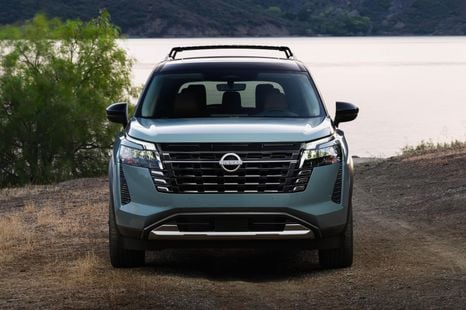

Damion Smy
Nissan previews four new off-road SUVs and a ute, including Ranger and Prado rivals – report
3 Days Ago
The Genesis GV80 luxury SUV looks a million bucks in the metal, and offers a features list that should give the Germans pause for thought. It's a heck of a first effort.
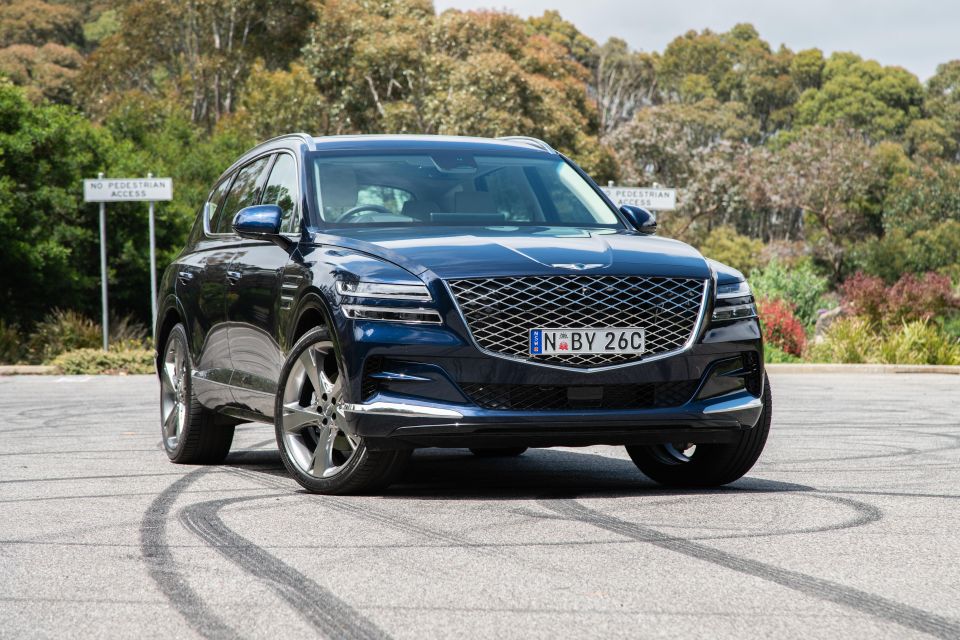
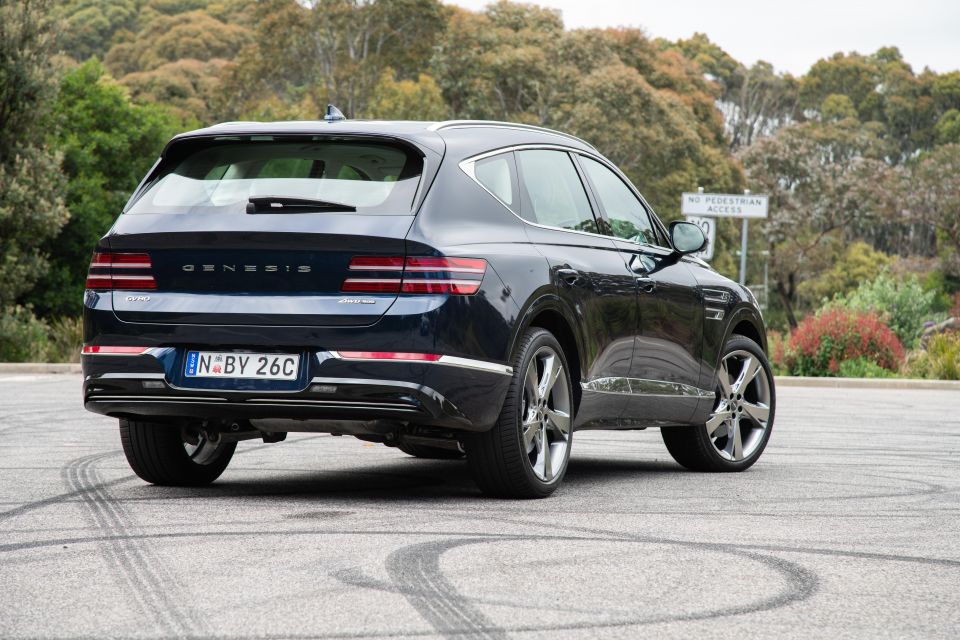

Quickly see how this car stacks up against its competition. Select any benchmark to see more details.
CarExpert brings reviews, research tools and trusted buying support together, guiding you from research to delivery with confidence.
Hyundai’s fledgling luxury brand Genesis is flush with new products, as it gets serious about tackling the established premium competitor set from Europe and Japan.
While the G70 and G80 sedans came first, the vital cog in its machine is the GV80 SUV tested here.
This undeniably eye-catching (Bentley-esque?) seven-seater lines up against the Audi Q7, BMW X5, Mercedes-Benz GLE, Volvo XC90, Lexus RX, and Volkswagen Touareg among others.
Genesis has thrown everything at it, to offset the lack of badge credibility. In terms of performance, technology, and customer care, it has a lot to offer.

But Genesis isn’t just a product play – it’s also trying some interesting sales tactics, with a slow build on the cards.
Sydney residents can view the cars at a brand-owned Genesis ‘studio’, or visit one of two New South Wales test drive and trade-in centres. A similar business model is being rolled out in Melbourne (mid-year) and Brisbane (later in 2021).
You can also book a test drive through the company’s website, and it’ll deliver a demo car through a program it calls ‘Genesis To You’. The company holds vehicles for this purpose in each region of Australia.
In time, this combination of dedicated viewing studios and test centres, with bring-to-you test drives, will be rolled out nationwide. At least, that’s the plan.
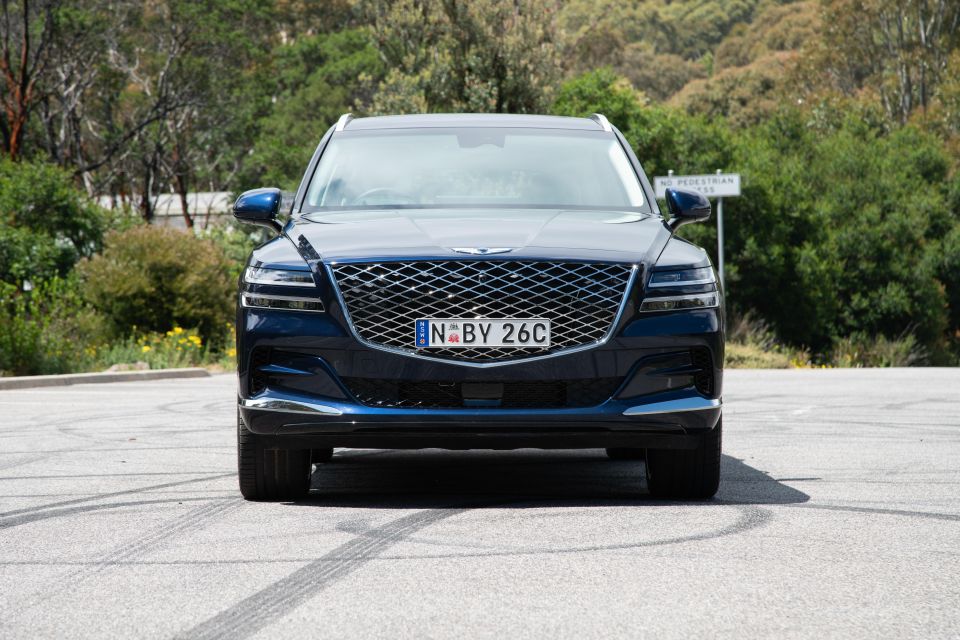
The GV80 range kicks off at $90,600 before on-road costs for the four-cylinder, rear-wheel drive (RWD) petrol model. For those fancying more acceleration, the twin-turbo V6 petrol range-topper with all-wheel drive (AWD) is available for $108,600.
Our test vehicle sits in the middle. It’s the GV80 3.0D with an inline-six diesel engine and AWD, priced at $103,600 before on-road costs.
It lines up precisely against a few Germans you might have heard of – notably the base four-cylinder BMW X5 xDrive25d and Mercedes-Benz GLE300d diesels, or the V6 Audi Q7 45 TDI.
Don’t put too much stock into list pricing, though. The drive-away cost on Genesis Australia’s configurator, with a NSW postcode, is $113,210 for the GV80 3.0D. You can pull the trigger and order online, too.
The company has a fixed-price model, so haggling could prove a challenge. This is not the case with the European brands. How this unfolds will prove interesting.
MORE: 2021 Genesis GV80 pricing and specs
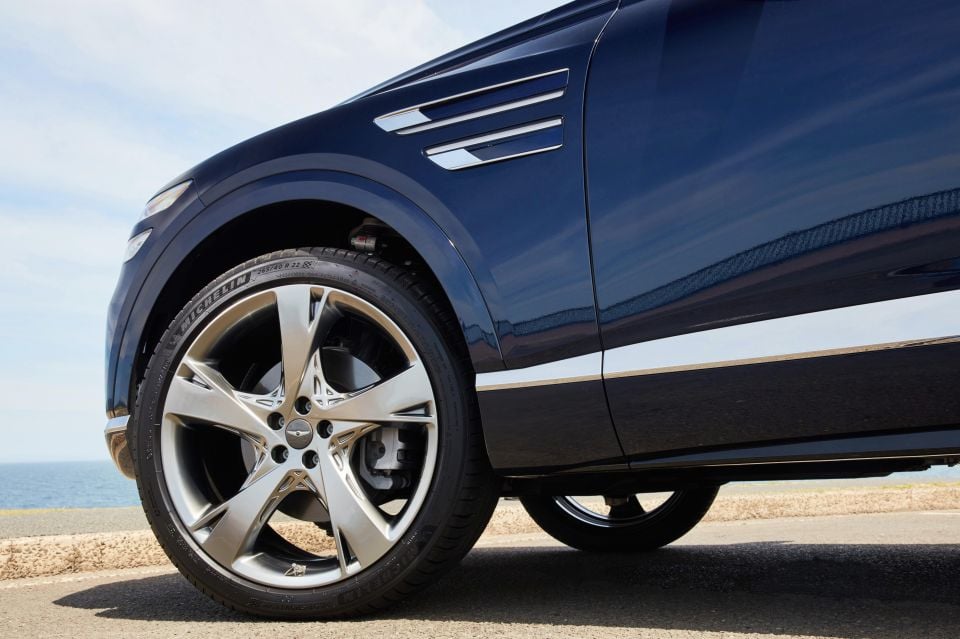
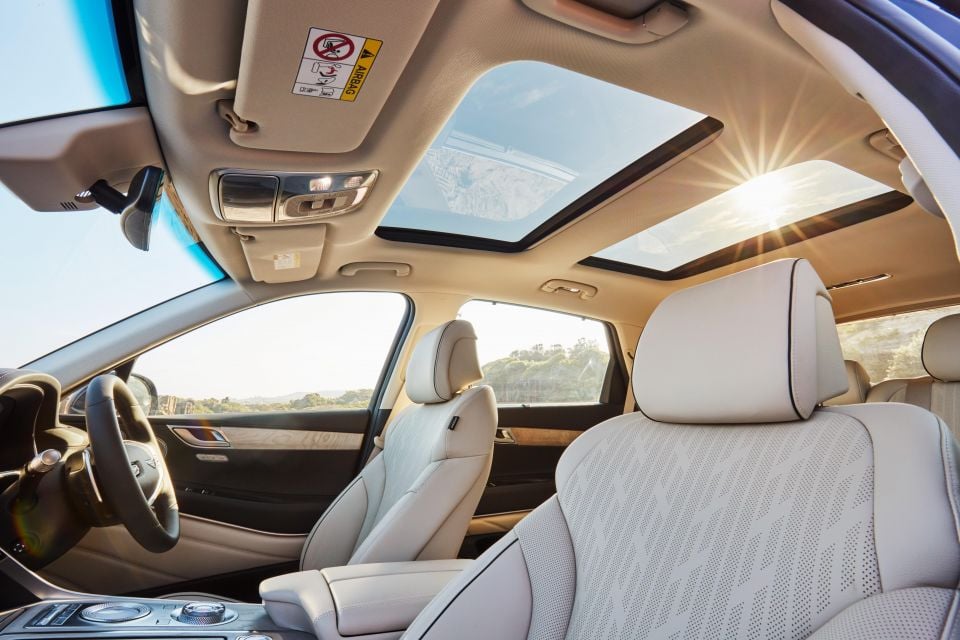
Buy your new car without the stress. It's fast, simple and completely free.
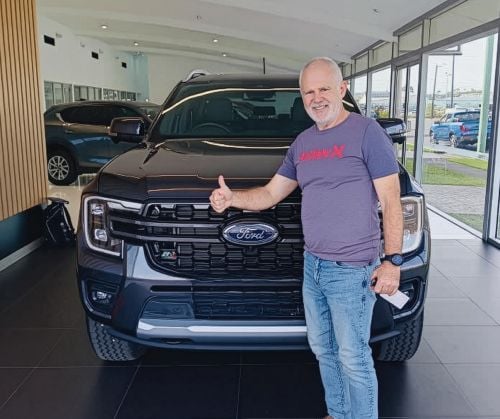
Great service from Travis and team, second time I have used this business would not hesitate to recommend them to anyone
Craig C.
Purchased a Ford Ranger in Sunshine Coast, QLD
CarExpert helped Craig save thousands on his Ford Ranger, now let us save you on your next new car.
Get your BEST priceWhile Genesis doesn’t necessarily undercut its more established competitors on price, it certainly offers more features for the money. This thing comes absolutely loaded.
On the outside there are huge 22-inch wheels wearing Michelin Pilot Sport 4 tyres (265/40), predictive adaptive dampers, a dual-pane panoramic sunroof, proximity key access, a hands-free electric tailgate, and an acoustic laminated windshield.
Inside you get genuine leather seats that are heated and cooled for driver and front passenger, front seats with 12-way power adjustment and driver memory presets, more leather on the dash and doors, open-pore wood trim inserts, ambient lighting signatures, two-zone climate control, and a power-adjustable steering column.
Cabin tech includes a 12.0-inch head-up display (HUD) projecting on the windscreen, blind-spot cameras in the half-digital instruments, a 14.5-inch HD centre screen controlled by touch or rotary dial, satellite-navigation with augmented reality overlay using the front camera, a wireless phone charger, DAB+ radio, a surround-view camera, and wired Apple CarPlay/Android Auto.
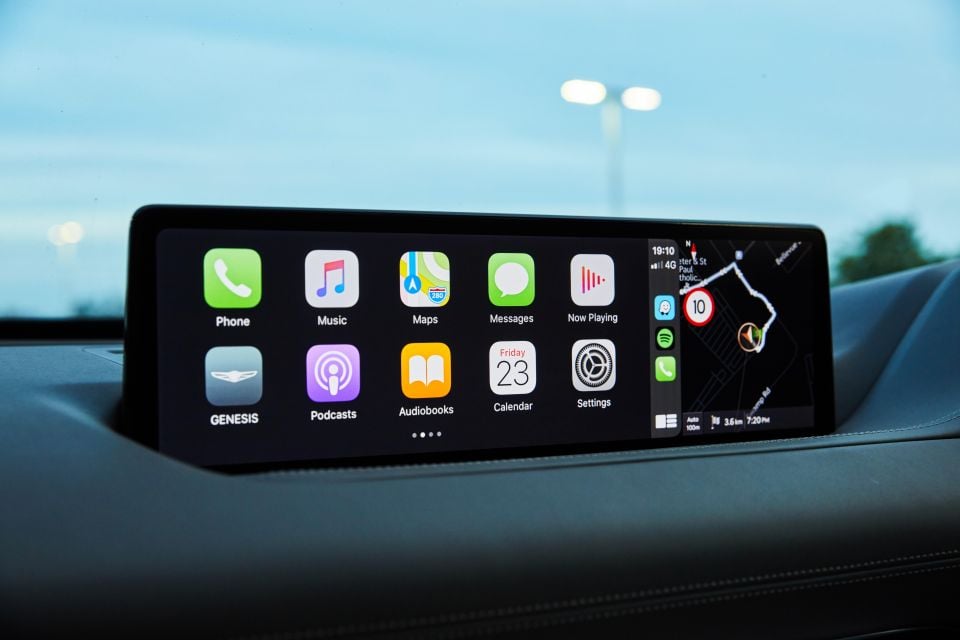
The standard 1050W sound system is supplied by Harman, and has 21 speakers.
Rather than offering a million-and-one options like most luxury brands, Genesis instead markets a Luxury Package for an additional $10,000. This package was not fitted to my test car, but it’s worth getting just for the sheer excess of it.
It includes: Matrix LED headlights, power soft-closing doors, quilted Nappa leather seats, suede headlining and pillars, three-zone climate control, a 12.3-inch fully digital instrument cluster with 3D effects, active noise-cancelling technology using countering sound waves, a remote parking assistant, heated and cooled second-row seats, power-adjustable second- and third-row seats, and a heated steering wheel.
Oh, and also an 18-way adjustable driver’s seat with a massage function. As if you’re not ticking that box…
Finally, you can shell out a very reasonable $2000 for matte paint, including a gorgeous deep ‘Brunswick Green’ hue that really does the shape justice.
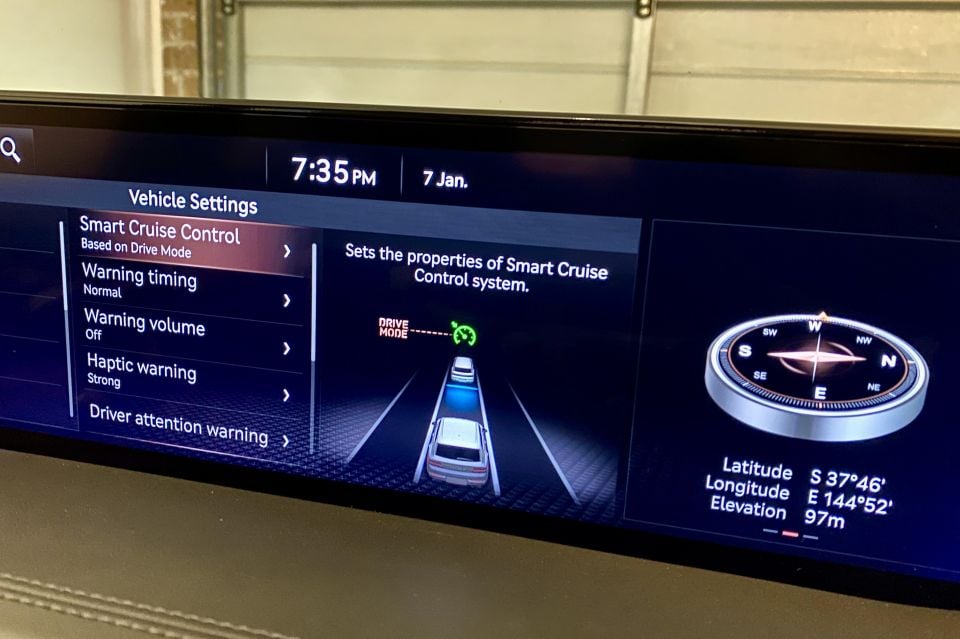
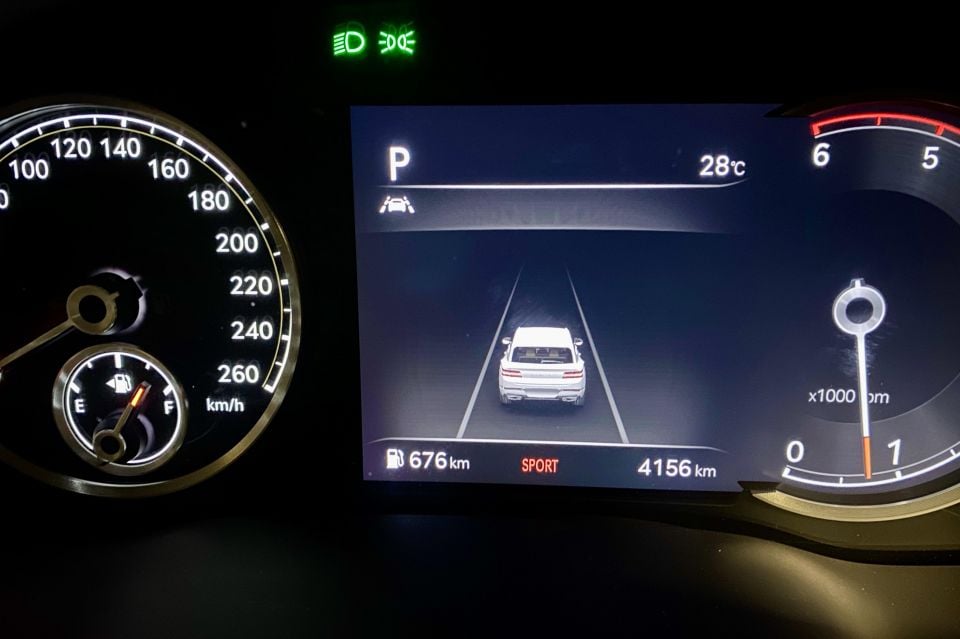
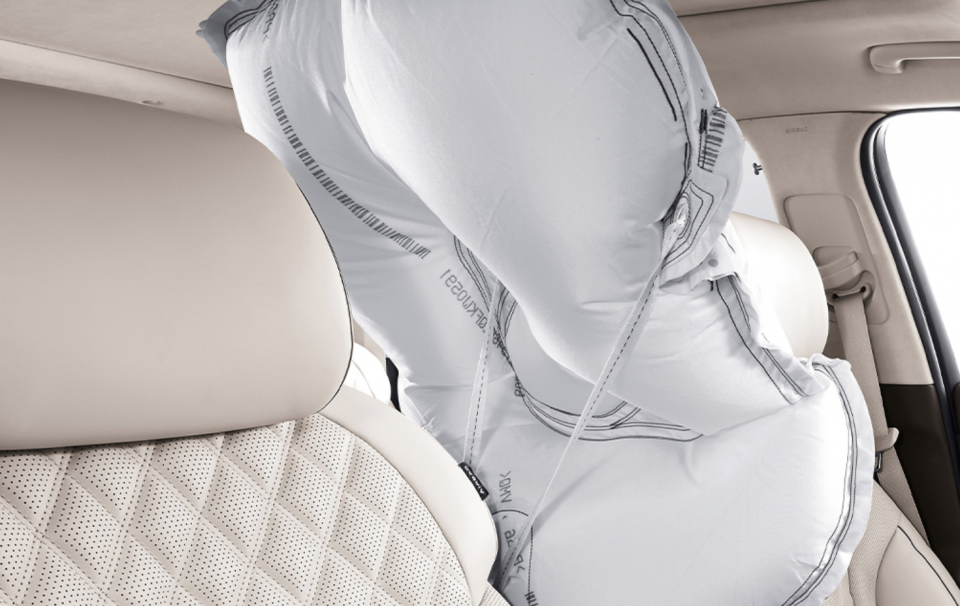
Standard safety features include 10 airbags – including a front-centre airbag designed to mitigate head clashes, and side curtain airbags that extend to the third seating row’s glass (but not pillars). Genesis also spruiks the extensive use of ultra-high-tensile steel in key hard points.
There’s also automated seatbelt tightening under sharp braking or steering, active blind-spot monitoring and collision avoidance, leading-vehicle departure alert, driver attention warning, active lane-keeping assist, a rear cross-traffic alert, and radar-guided active cruise control.
A system called Safe Exit Alert is designed to stop you opening your door into an oncoming cyclist, by monitoring parallel traffic when you’ve parked. This system can also prevent kids in the back from opening their door, even after you unlock the electronic child-safety door lock.
The autonomous emergency braking (AEB) system can detect other cars as well as pedestrians and cyclists, works at junctions, and can sync with the automated evasive steering aid (which the driver can override). If you buy that Luxury Pack you also get AEB in reverse gear.
Crash tester ANCAP is yet to publish any test results, but the GV80 certainly ticks the boxes.
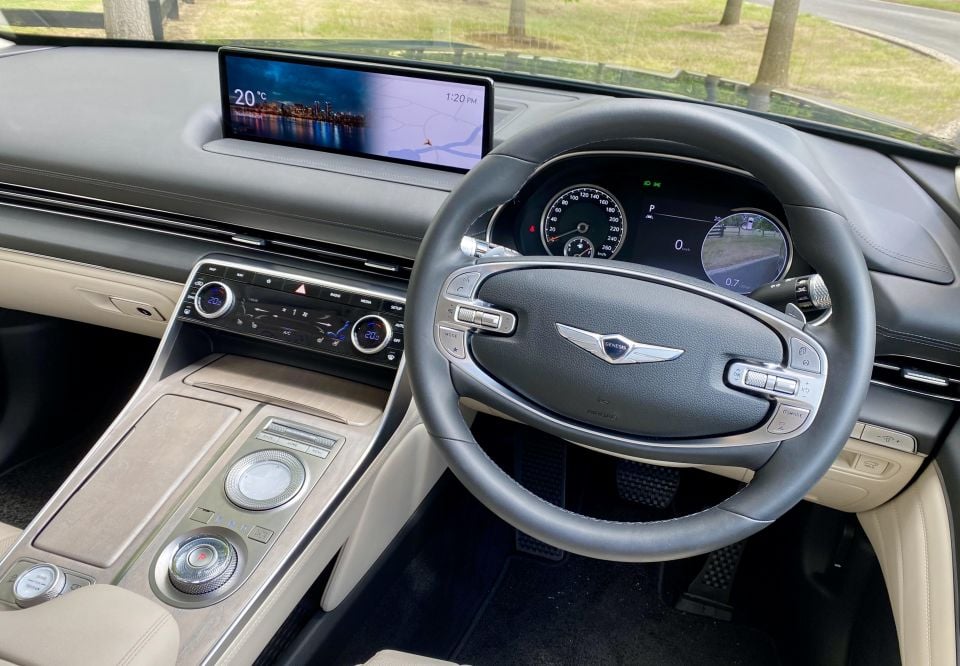
The interior is distinctively designed. There’s a horizontal motif, exemplified by the dashtop widescreen, slim vents, and the way the leather dash wraps into the door trims.
The stitched leather and light open-pore wood are properly premium, as are the stalks and damped buttons. Our test car had cream leather and headlining to offset the black dash, though you can option tan or black leather with various wood trims instead. Personally I liked the ambience.
The seats are highly supportive and nicely trimmed, even though we didn’t have the quilted leather pews with massaging modes, and the electric steering column adjustment has plenty of movement fore and aft, up and down. The ventilation was great on my 38-degree test day.
Mercifully, the use of dreaded dust- and scratch-prone gloss black plastic is limited to the ventilation controls, which are touch capacitive and allow haptic feedback. Thankfully, they’re quite simple and intuitive to use, and are not reliant on touchscreen sub menus to function.
The mammoth 14.5-inch centre screen can be controlled by touch, though it’s a bit of a stretch to reach and could be tilted towards the driver a little more for better ergonomics.
You can use a spinning circular selector on the transmission tunnel to control the screen too, the top of which also detects handwriting, where you write out an address with your finger on the surface.
Genesis calls this a “classy, jewellery-inspired integrated controller” though in reality it’s a little trickier than a BMW iDrive dial. Still, I do like the presence of these hardpoints overall, since they are simpler to use on-the-fly than modern touchscreen-laden Audis or Volvos.
There are no complaints from me around the way the infotainment software works. The 2560 x 720 LCD screen is beautiful, particularly in its default home mode where the map bleeds softly into a dark urban landscape shot.
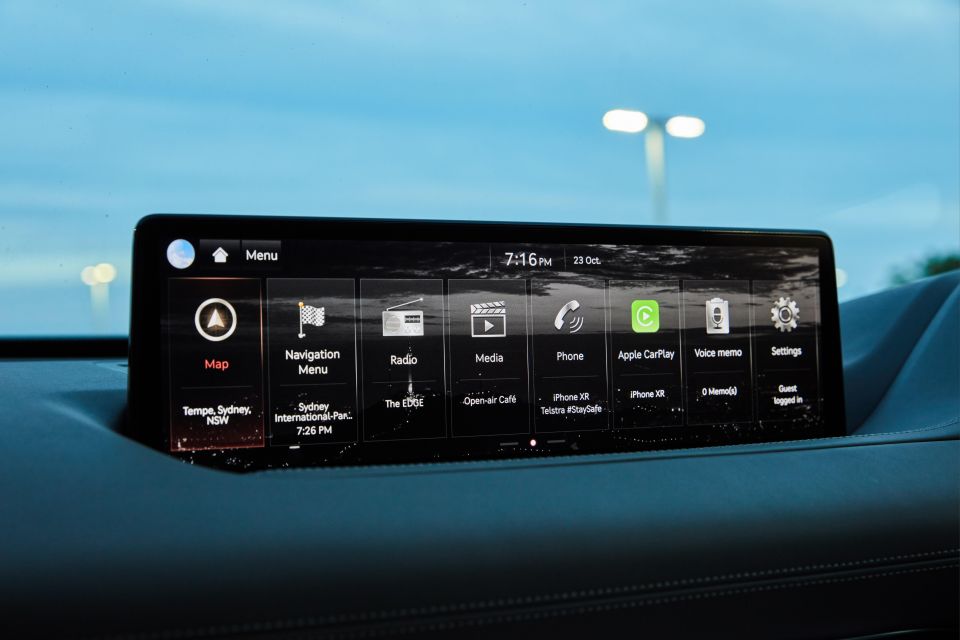
There are various tiles you scroll through horizontally, and it swipes, pinches and zooms rather like an iPhone if you’re touching it.
The Apple CarPlay integration takes up most of the real estate, as do the lovely maps with Mercedes-style augmented reality navigation overlays, juxtaposing live front-camera footage and animated directional arrows.
There are also some rather interesting menus such as an in-built voice memo recorder, and a Sounds Of Nature menu that lets you scroll through and play ambient noises including Lively Forest, Calm Sea Waves, or Rainy Day.
They are a novel experiential element that work in tandem with the ambient light piping.
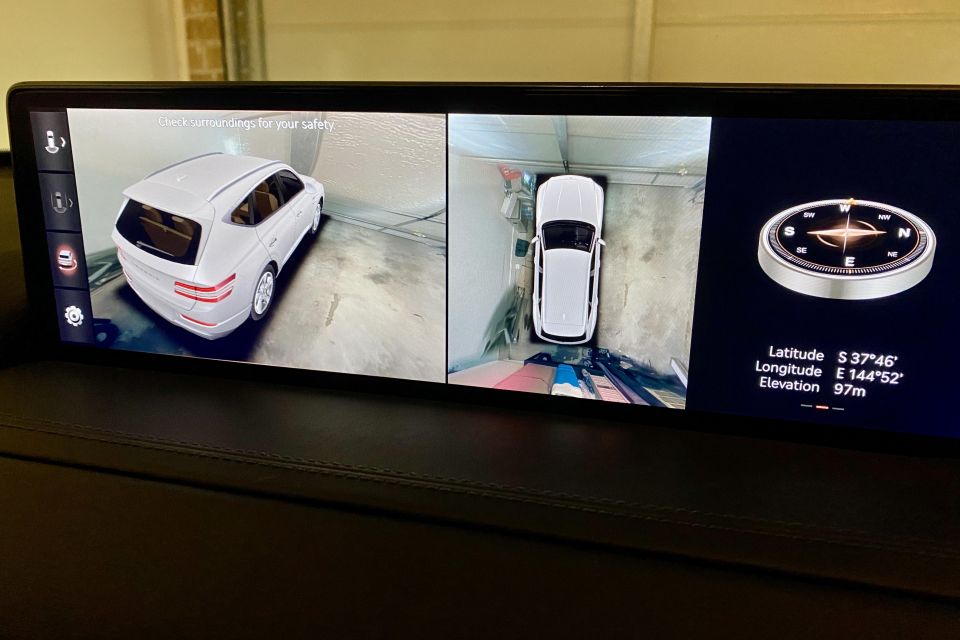
The surround-view camera is something else, too. Instead of only showing you what the cameras take in, it displays a 3D animation of the vehicle like a site configurator might, and lets you move it around with a finger so you can see around you. In my tight garage, it was very helpful.
I was a smidge disappointed that the key-fob-controlled remote parking assistant wasn’t standard though, for the same reason. It’s standard on a $65,000 Kia Sorento…
Other dislikes? I’m not sold on the steering wheel design, even though there’s scalloping where the chunky centre piece meets the rim, so it’s not as hard to hold as it might appear. Something about it just looks ‘off’.
The instruments are half-analogue and half-digital in standard specification, with the right-side showing your blind-spots when indicating. They’re augmented by a projecting HUD showing you speed and giving you directions. Nevertheless, a $30,000 Skoda Kamiq has fully digitised dials these days.
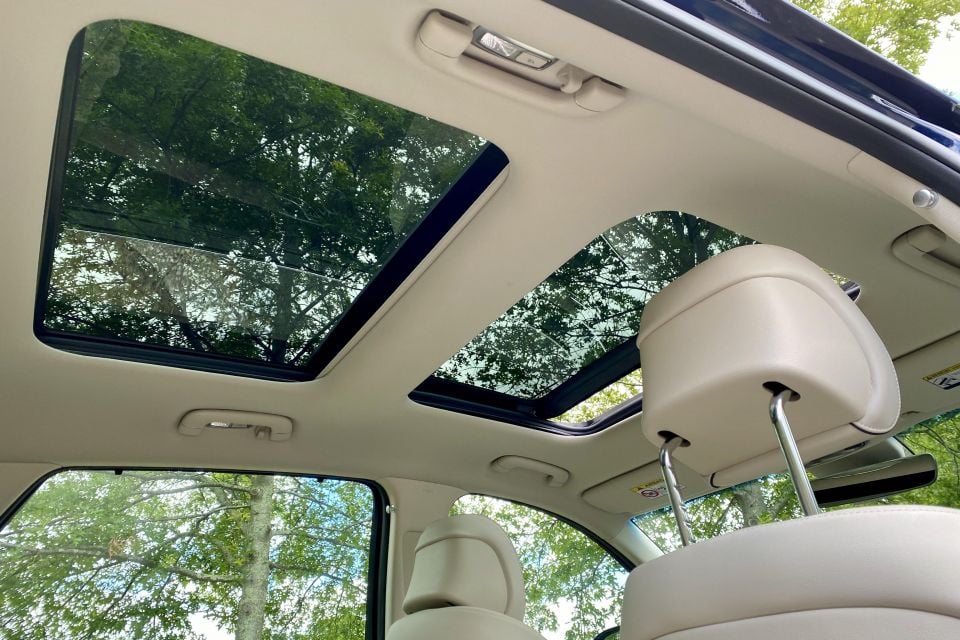
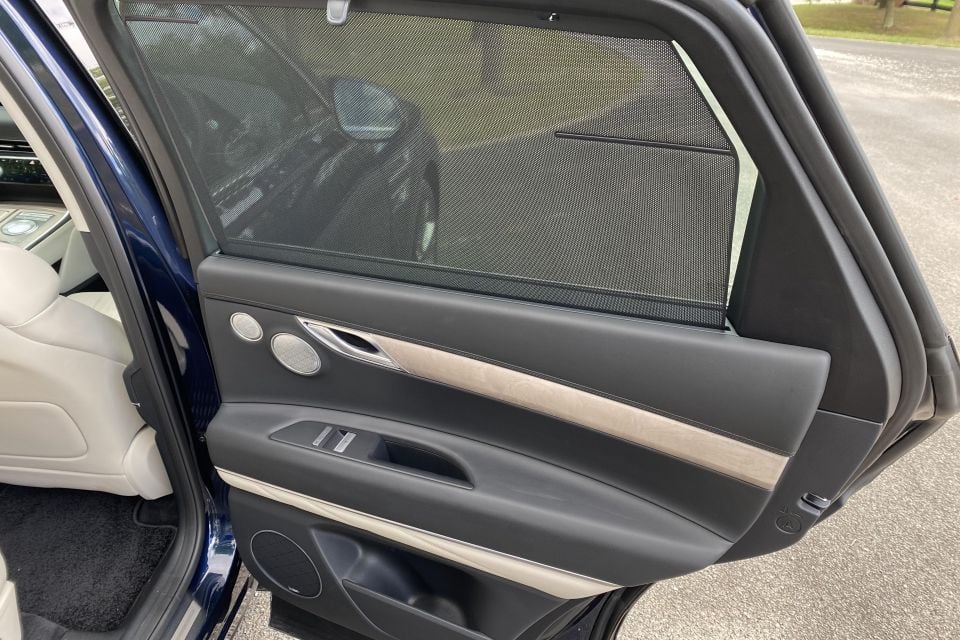
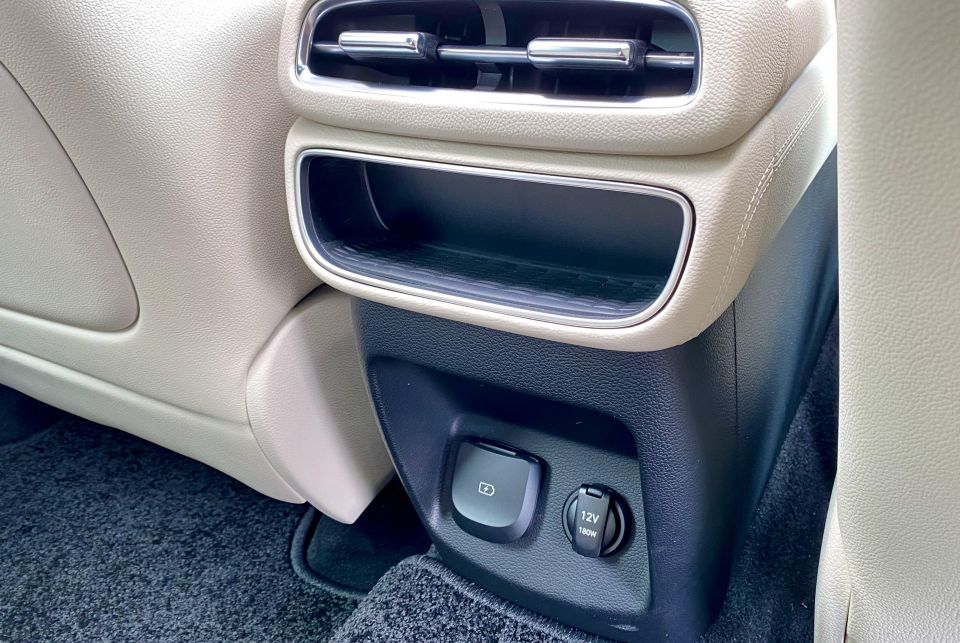
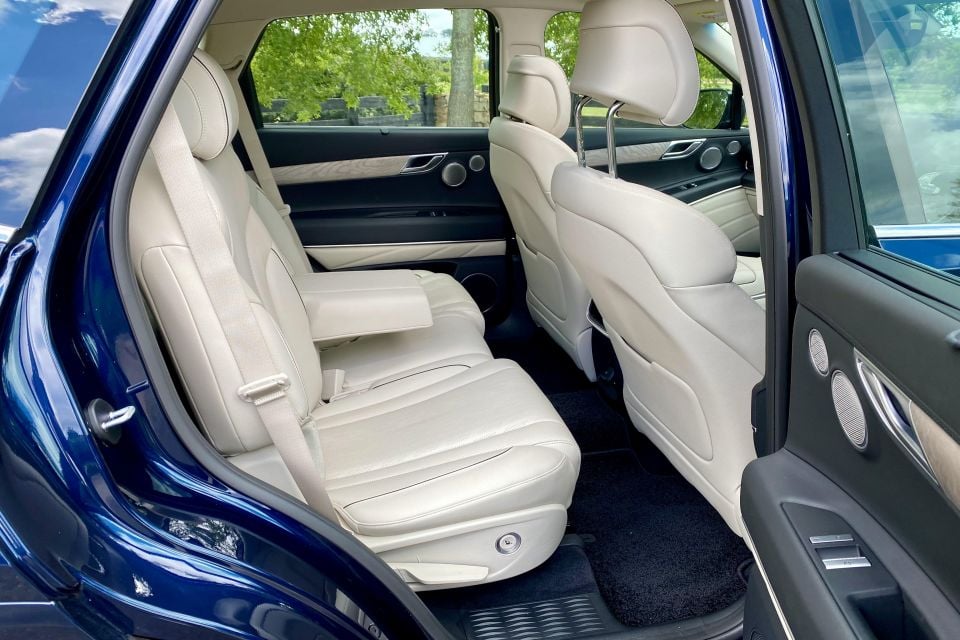
Cabin storage is okay. There’s a nice open area liberated below the shift-by-wire gear dial, two covered cubbies above, and a split-opening centre console that’s beautifully lined. But the door bins are a bit narrow, if you’re in the habit of carrying a big bottle.
Space in the middle seat row is excellent – I’m 194cm and sat behind my 2.0m-plus tall colleague with legroom and toe room to spare. The seats also recline generously. The light colour palette of the headlining, the wood inserts, big wide windows, and twin-pane glass roof really lighten the ambience.
Middle-row occupants as standard get their own USB and 12V inputs, air vents, coat hooks, lighting, pull-up sun blinds, and grab handles. But only GV80s with the Luxury Pack get separate rear temperature controls.
The middle-row seats tilt and slide via a button, to open an aperture into the third row. These seats are best saved for kids, or for adults on short trips, though rearmost occupants still get their own vents and controls. These seats fold neatly flat into the floor when not in use.
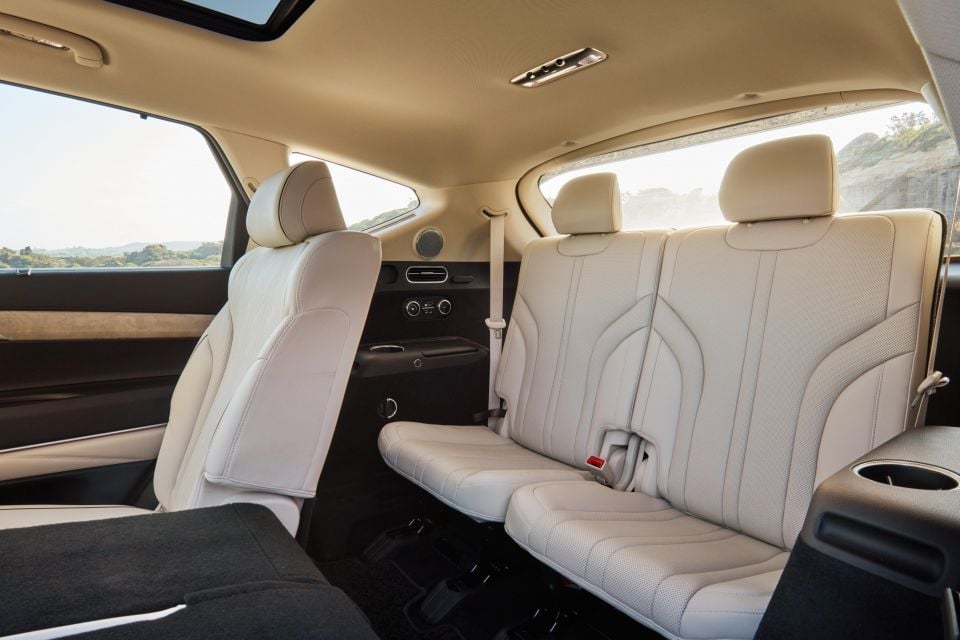
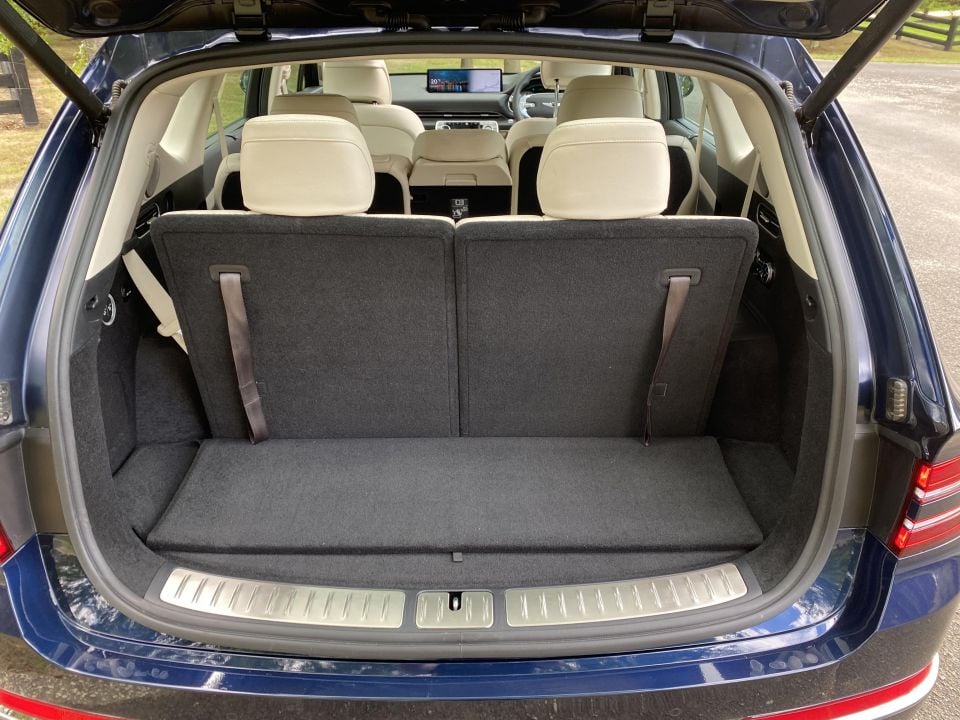
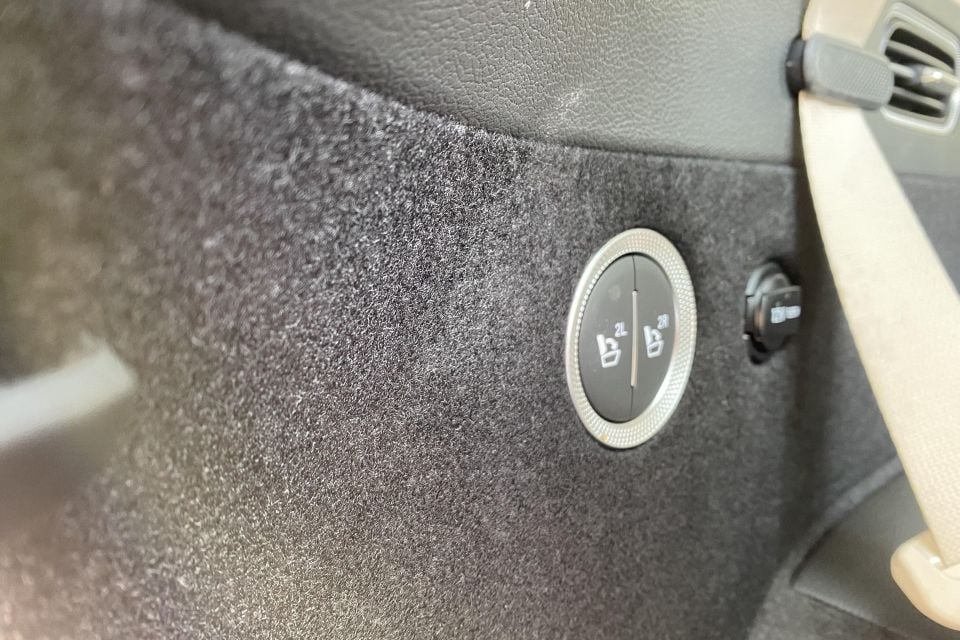
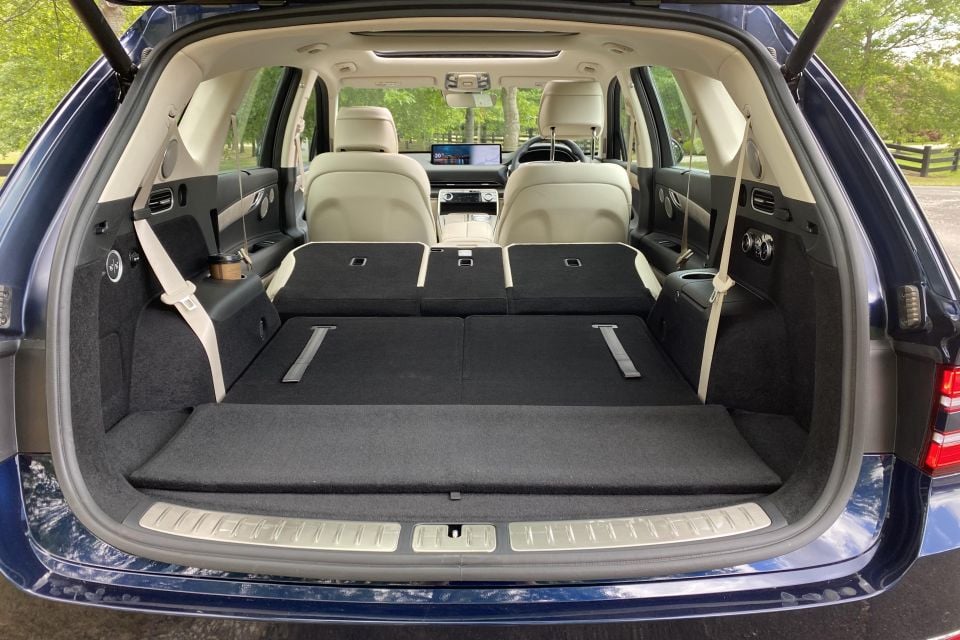
By the way, if your children are engrossed in their iPads and can’t hear you, you have the option of using an intercom function in the touchscreen that amplifies the voices of those in the front row.
With seven seats in use, there’s enough cargo space for an esky and a few stacked carry-on suitcases. This space grows to 727 litres with them folded (leaving just five seats deployed). Buttons in the cargo area also flip-fold the middle-row seats flat, upping storage space to a van-like 2144L. It’s all nicely carpeted, too.
Despite its SUV pretensions, the GV80 only has a spare tyre in the rear-wheel drive 2.5T base model and then it’s just a space-saver. All other variants including this one have a tyre repair kit. For family road trips this might not be ideal.
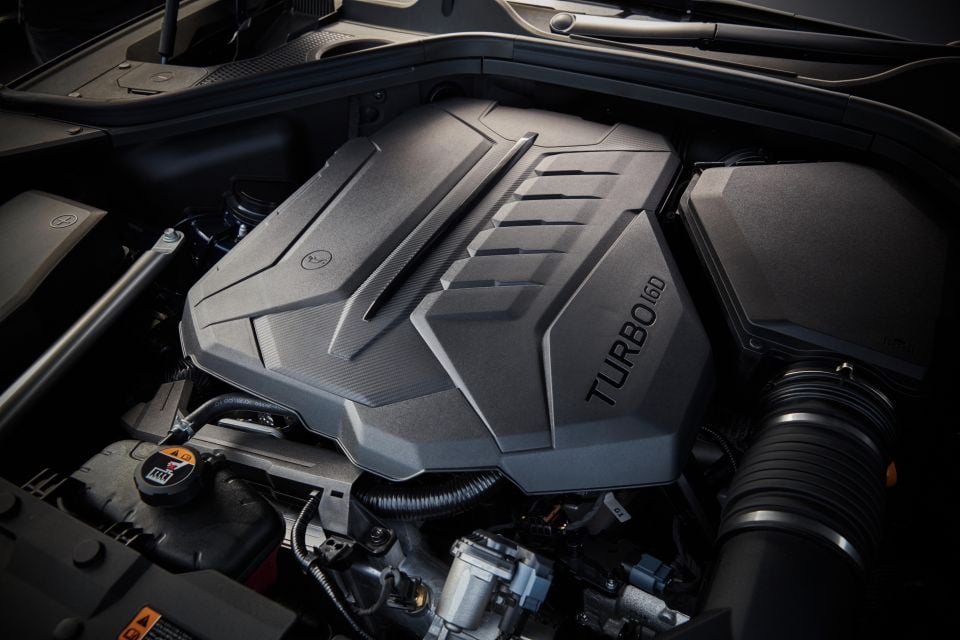
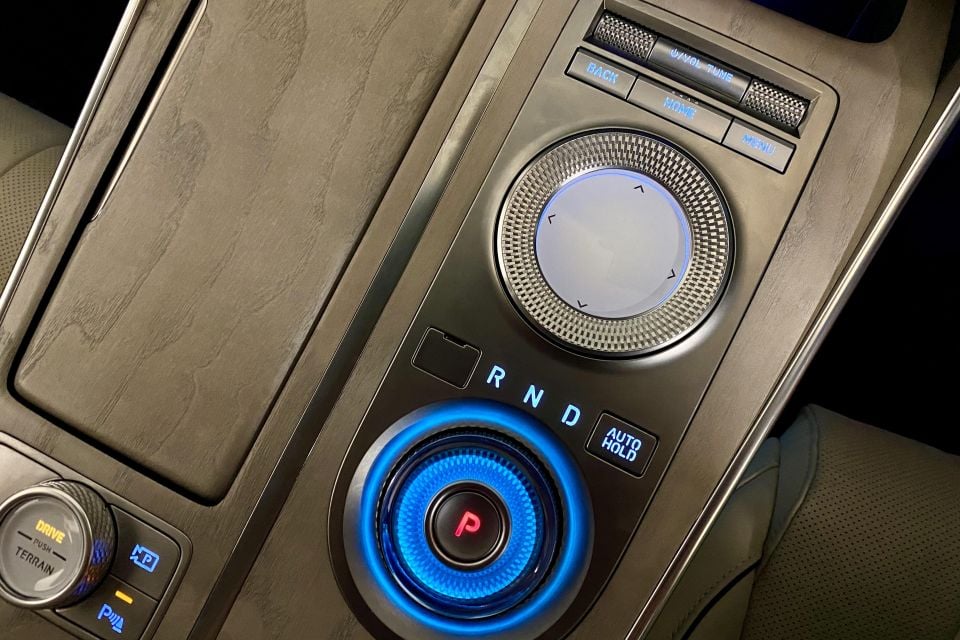
Where the equivalently-priced BMW X5 and Mercedes-Benz GLE use four-cylinder diesels, the Genesis GV80 has a 3.0-litre inline-six turbo-diesel producing 204kW of power at 3800rpm, and a healthy 588Nm of peak torque from 1500 to 3000rpm.
It’s sufficient to push the circa 2.3-tonne SUV from standstill to 100km/h in 6.8 seconds. It’s mated to an eight-speed automatic transmission and an on-demand AWD system.
Combined cycle fuel use in bench testing was 8.8 litres per 100km, which with the 80L tank gives you a range near 900km. I averaged in the mid-6s on highways but double digits in urban commuting. It’s only Euro 5-complaint and lacks stop/start.
For a vehicle of this size, a large effortless diesel is the best choice – especially one with plenty of sound- and vibration-mitigation like this one. Just for context, the 279kW/530Nm twin-turbo petrol V6 option enables a 0-100km/h time of 5.5 seconds, but uses 11.7L/100km.
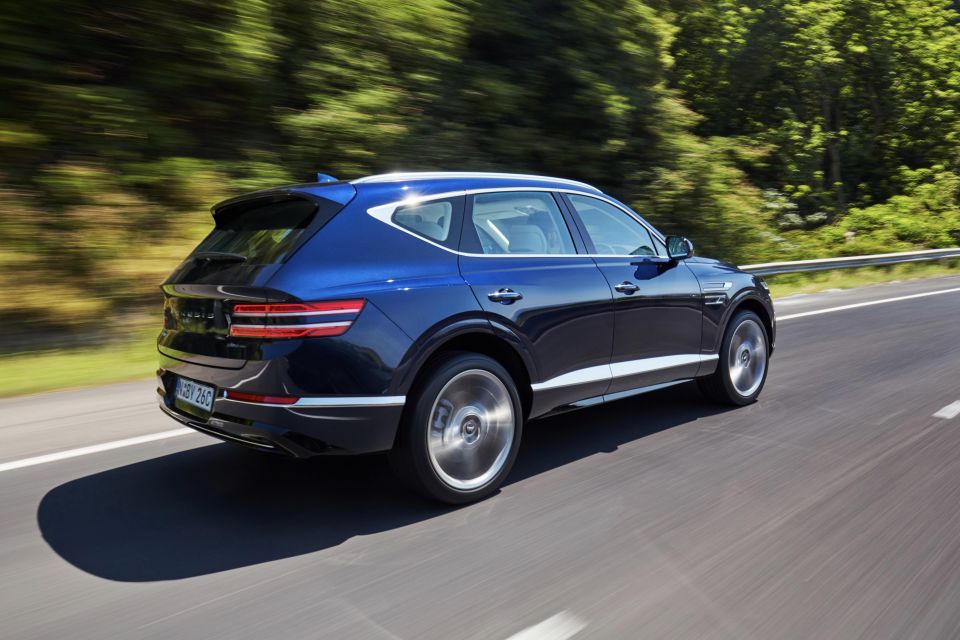
The engine is a ripper, with ample torque from low down in the rev band ensuring crisp rolling response. It’s also very refined for an oil-burner, with very little in the way of vibrations or clattering.
It’s an engine that suits a relaxed driving style and highway cruising, and makes overtaking as effortless as you’d expect. The eight-speed transmission does its best to be as inconspicuous as possible, as it should. We think this drivetrain is the optimal choice for such a large SUV.
It can tow 2722kg, by the way.
In terms of driving dynamics, the company’s Australian division says it wants the GV80 to have a “distinctly sporty side, but not at the expense of comfort”.
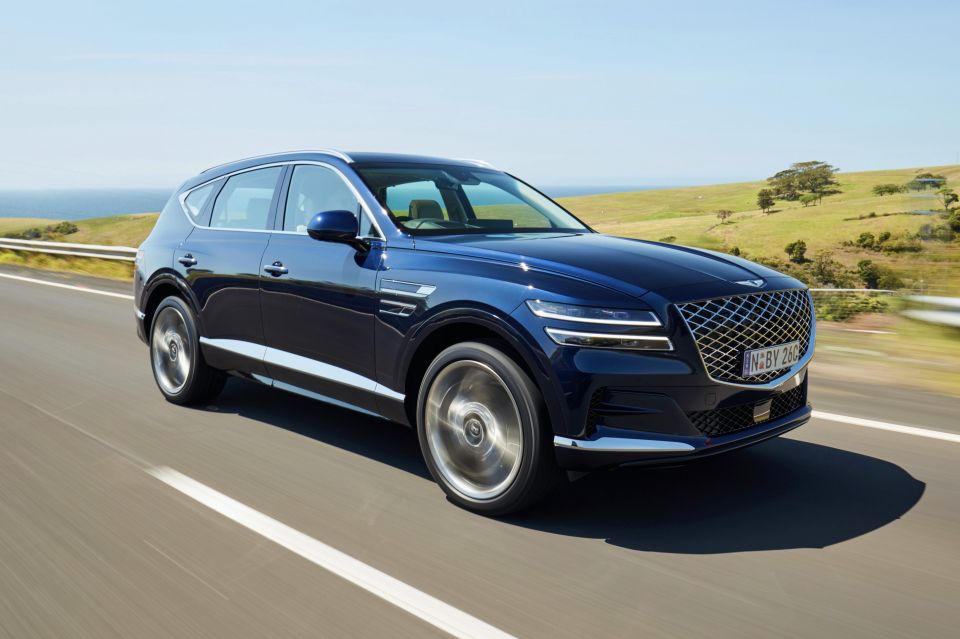
CarExpert brings reviews, research tools and trusted buying support together, guiding you from research to delivery with confidence.
As with parent company Hyundai, Genesis Australia conducted extensive suspension calibration on local roads, choosing its own bespoke tune after six months of testing.
The diesel and its twin-turbo V6 petrol sibling come standard with trick adaptive dampers, which are controlled through a drive-mode selector dial that also subtly changes the steering resistance and throttle mapping to suit a given style.
They’re also linked to a front camera which picks up imminent bumps and automatically modifies the dampers’ force levels to soak them up as well as possible. Tricky stuff, that.
The AWD system comes with various surface-specific traction modes controlled by that aforementioned drive-mode selector dial, and a rear limited-slip differential to apportion torque side-to-side – this both improves cornering, and off-road traction over uneven surfaces.
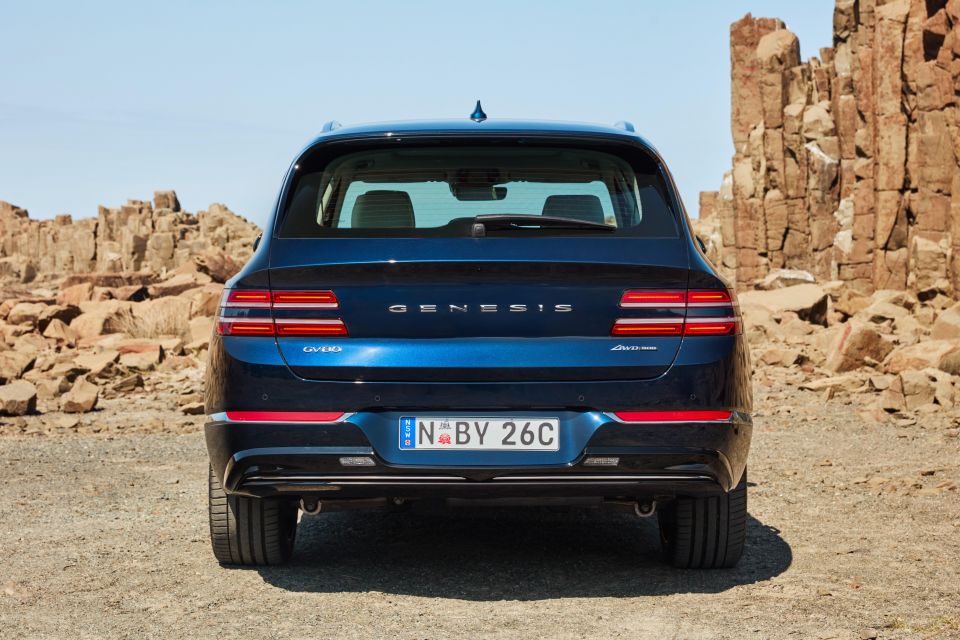
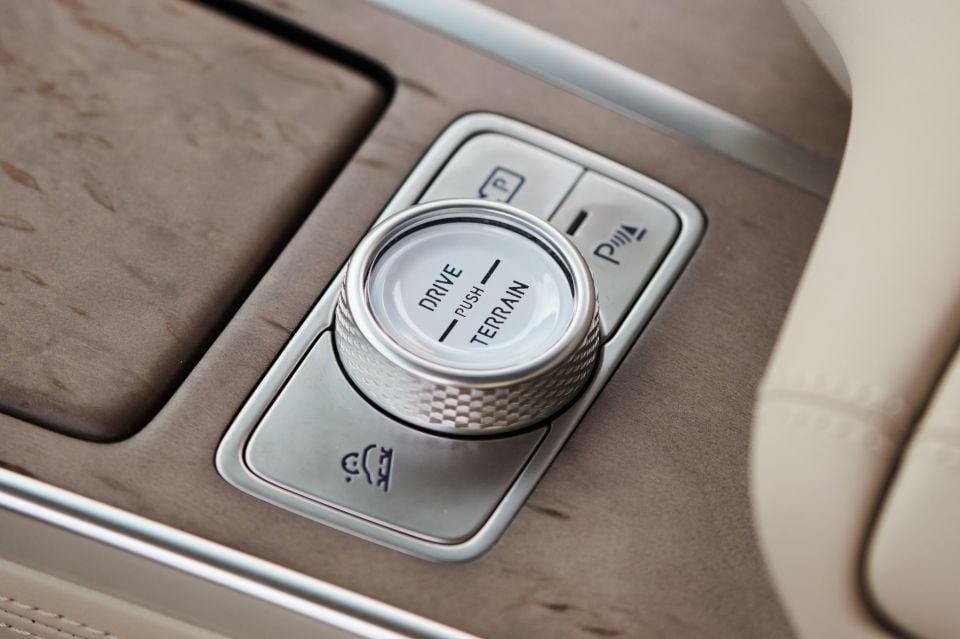
It all sounds great, and more often than not the GV80 is nice to drive: refined and cosseting on highways, smooth and supple at low speeds in town, and while not the final word at staying flat in corners (like a Porsche Cayenne), at least respectably capable of being driven briskly.
However, the GV80 rides on huge 22-inch wheels with slim tyre sidewalls, and as such you do occasionally notice some thumping or jarring over pockmarked or rutted roads, particularly at a higher clip. Perhaps chambered air suspension is the answer here?
In fairness, rivals such as the Volvo XC90 and Mercedes-Benz GLE on similarly slim rubber are also quite stiff. It’s a stylistic trade-off.
I thought the brakes were excellent. They have an Integrated Electric Booster that reduces pedal vibration, and while the actual pedal feel is lacking, they certainly wiped off speed effectively.

All new Genesis cars come with a five-year warranty and 24/7 roadside assist program for private buyers.
You also get the first five scheduled services (intervals of 12 months or 15,000km for the diesel) completely free-of-charge.
The company has servicing locations nationwide. Initially, they’ll be staffed with trained Genesis ‘master technicians’ at Hyundai workshops, but separate Genesis-branded service centres are said to be in the works. Genesis Australia is also rolling out a valet program.
If you live or work within 70km of a Genesis studio or test centre, it’ll send someone to pick up your vehicle for servicing, and leave you with a courtesy vehicle for the day. The brand plans to offer these valet services centres in each state, once it has sold more vehicles.
In short, the eventual ownership plan looks market-leading, though it’s still scaling up.
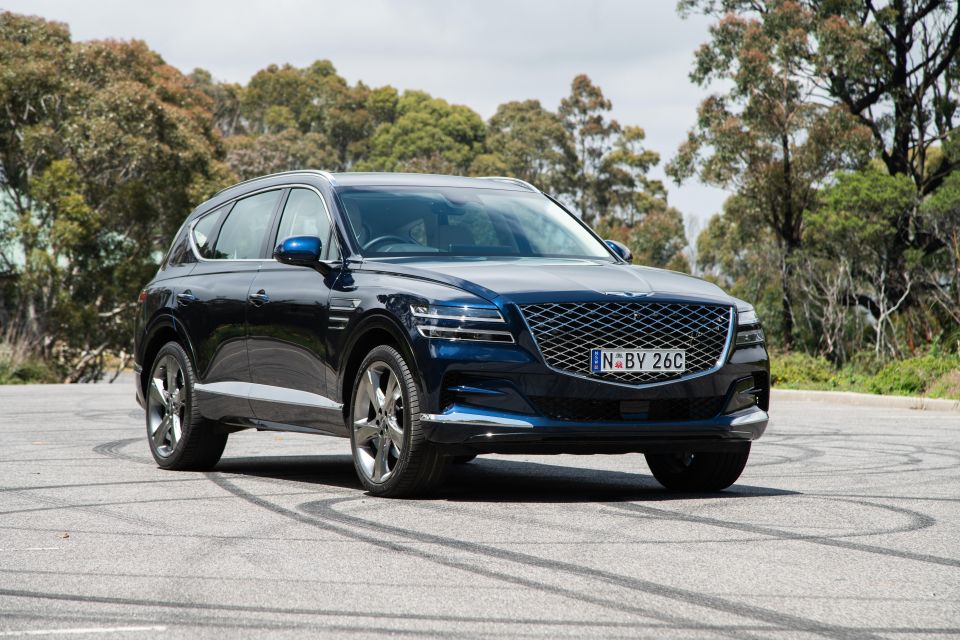
It takes some boldness to look at a Genesis when there are so many brilliant competitor vehicles for similar money, most with greater badge cred.
But the products are genuinely good. The GV80 looks imposing and distinctive at once, the interior is well-specified and plush, and the drivetrain offers plenty of poke. It feels very much like a standalone product, made to a very high standard.
Genesis looks set for the long haul. Its novel sales and servicing strategy already gives it a point-of-difference, as does its highly online fixed-price model. Of course it’ll take time to get up and running at scale, but there are few reasons to doubt it’ll get there in the end.
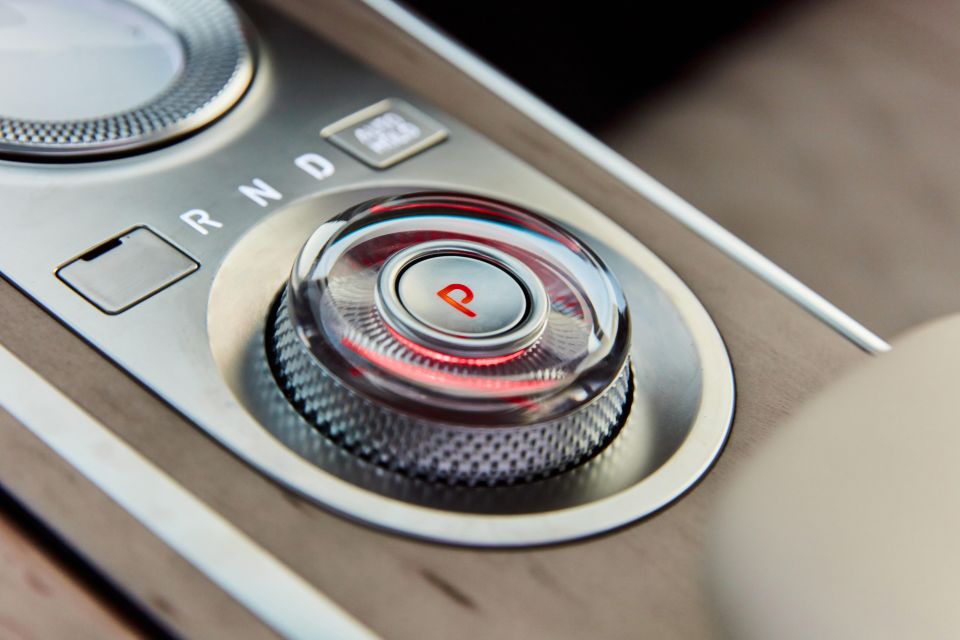
Click the images for the full gallery
MORE: Genesis GV80 news and reviews MORE: Everything Genesis
CarExpert brings reviews, research tools and trusted buying support together, guiding you from research to delivery with confidence.
Genesis GV80
Genesis GV80 Sales rolling 12-months#
*Based on VFACTS and EVC data
Looking for complete Genesis GV80 price history?
Our Genesis GV80 Pricing Page shows exactly how prices have changed over time.
2026
$120,000
2026
$136,000
Add CarExpert as a Preferred Source on Google so your search results prioritise writing by actual experts, not AI.


Damion Smy
3 Days Ago
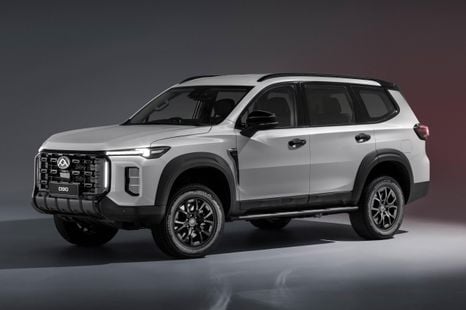

Damion Smy
6 Days Ago
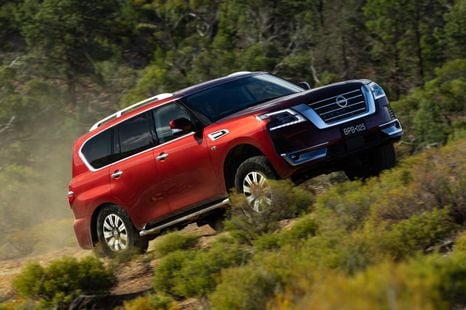

Damion Smy
7 Days Ago
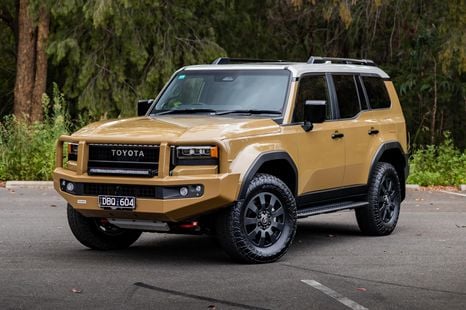

Damion Smy
7 Days Ago
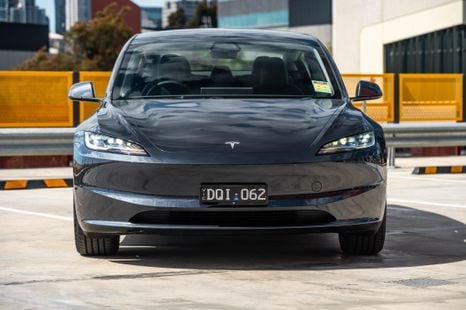

Josh Nevett
9 Days Ago
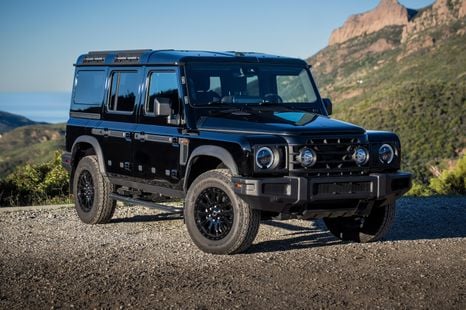

Damion Smy
11 Days Ago
Add CarExpert as a Preferred Source on Google so your search results prioritise writing by actual experts, not AI.
* Average savings based on recent CarExpert customer transactions. Actual savings will vary depending on vehicle make and model, location, stock availability, and other factors.
† Displayed prices exclude on-road costs such as delivery charges, registration fees, number plates, insurance and applicable road taxes. These prices are subject to change without notice and may not reflect current market pricing or dealer offers.
 Automotive Vehicle Spec Data & 4K images Powered by JATO Dynamics Ltd
Automotive Vehicle Spec Data & 4K images Powered by JATO Dynamics Ltd